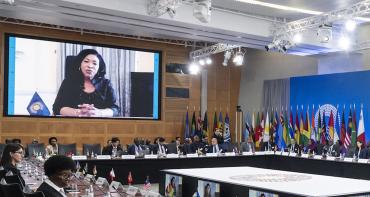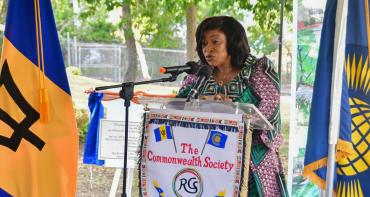Addressing the 6th Biennial Commonwealth Ministers for Public Service Forum in Putrajaya, Malaysia, Secretary-General Patricia Scotland urged governments to deliver excellence and uphold the ideals of innovation, integrity and inclusivity in public service.

If the world is to achieve ambitious goals to end poverty, reduce inequality and combat climate change, increased focus must be placed on governance, the Secretary-General of the Commonwealth has said.
Addressing the 6th Biennial Commonwealth Ministers for Public Service Forum, on Wednesday 17 August 2016, in Putrajaya, Malaysia, Secretary-General Patricia Scotland urged governments to deliver excellence and uphold the ideals of innovation, integrity and inclusivity in public service.
“A vital need in many of our Commonwealth member states at all levels of government is to create agile public institutions that are efficient, effective, and accountable,” she said. “This requires greater public transparency, with democratic oversight and institutional responsiveness in all aspects of public procurement, public financial management, and rigorous provision and enforcement of anti-corruption measures.”
The Secretary-General’s call at the opening of the ministerial forum was backed by the Ministers, who argued that the public service will be a “key driver” for delivering the Sustainable Development Goals by the target date of 2030. In a joint message, the Ministers stressed the importance of “building effective, transparent and accountable public institutions”. They also acknowledged that the “cost of corruption is detrimental to the achievement of sustainable development” and called for strengthening the integrity and professionalism of public servants.
Secretary-General Scotland described the forum as a potential “springboard” for collective Commonwealth action to implement Agenda 2030 – mobilising fresh commitment and expertise to overcome impediments to achieving the SDGs. However the Commonwealth leader warned that, in order to deliver on the global goals, all countries must take steps to clamp down on poor practice and strengthen integrity efforts to promote good governance.
“The gap between what is needed to implement the Sustainable Development Goals and what is available roughly equates to what is siphoned off through corruption. If our countries are to deliver on the SDGs, dealing with that level of corruption becomes non-negotiable,” she said.
At the forum, the Commonwealth Secretariat launched a new research study, entitled Key Principles of Public Sector Reform: Case Studies and Frameworks, which offers case studies on public sector reforms in more than a dozen countries. The Ministers welcomed the publication, which draws on the experiences of senior public servants from across the Commonwealth, and looks at how governments have achieved success and sought to overcome failures.
The Ministers joined the Secretary-General in expressing their “deep gratitude” to the government and people of Malaysia for hosting the meeting for the second successive time. The chairperson was Datuk Joseph Entulu anak Belaun, a Minister in the Prime Minister’s Department.
Notes to Editors:
The 6th Biennial Commonwealth Ministers for Public Service Forum was held, on 17 August 2016, in Putrajaya, Malaysia, under the theme ‘Governance for Sustainable Development: Supporting the implementation of the 2030 Agenda for Sustainable Development’.
The forum brought together Ministers, heads of public service and other senior public officials from Commonwealth countries to discuss implementation of the 2030 Agenda for Sustainable Development. It took place on the eve of the Commonwealth Association for Public Administration and Management (CAPAM) biennial conference, which begins on 18 August.
The World Bank estimates that bribes alone cost the world economy about a US$1 trillion a year and corruption US$3 trillion. The estimate for achieving the Agenda 2030 for Sustainable Development is about US$5-7 trillion per year, leaving a financing gap of $2.5 trillion.
Commonwealth Secretary-General Patricia Scotland announced in April her plans to open a Commonwealth Office of Criminal and Civil Justice Reform. This office will share templates for legislative reform and implementation of best practices.



